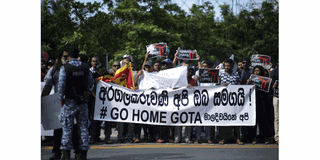Prime
Fleeing Sri Lankan President Rajapaksa faces protests in Maldives

Sri Lankans living in the Maldives stage a demonstration in Male on July 13, 2022, to protest for the arrival of former President Gotabaya Rajapaksa who is fleeing his own country after thousands of protesters overran his official residence accusing him of responsibility for Sri Lanka's worst economic crisis. PHOTO/AFP
What you need to know:
- Local reports suggested that Rajapaksa was staying at an exclusive resort and would leave for either the United Arab Emirates or Singapore later Wednesday.
Escaping Sri Lankan President Gotabaya Rajapaksa faced protests in the Maldives Wednesday with dozens of compatriots urging Male not to provide him safe heaven.
Sri Lankan expatriates carrying flags and placards denounced Rajapaksa, who fled his country early Wednesday after protesters overran his Colombo residence at the weekend over the worsening economic crisis in the South Asian nation.
"Dear Maldivian friends, please urge your government not to safeguard criminals," said a black and white banner held by Sri Lankans working in the islands' tiny capital.

Sri Lankans living in the Maldives stage a demonstration in Male on July 13, 2022, to protest for the arrival of former President Gotabaya Rajapaksa who is fleeing his own country after thousands of protesters overran his official residence accusing him of responsibility for Sri Lanka's worst economic crisis. PHOTO/AFP
Local media carried unverified videos of residents shouting insults at Rajapaksa as he walked out of the Velana International airport following his arrival on a military aircraft.
As Sri Lankans protested at an artificial beach area in Male on Wednesday, Special Operations police confiscated placards and dispersed the demonstrators, witnesses said.
Local reports suggested that Rajapaksa was staying at an exclusive resort and would leave for either the United Arab Emirates or Singapore later Wednesday.
"He is going into exile in either of the two locations," a Sri Lankan security source in Colombo said. "Ensuring security would be a challenge because there are Sri Lankan communities in both."
The main opposition Progressive Party of Maldives opposed the granting of free passage to Rajapaksa, who faces several court cases, including allegations of war crimes.
"We are betraying our friends in Sri Lanka by accepting Rajapaksa, a hated figure in that country," a PPM leader told AFP.

Sri Lanka's President Gotabaya Rajapaksa. PHOTO/FILE/AFP
The two countries have close ties and a considerable Maldivian community lives in the bigger island nation, while a significant number of Sri Lankans work in education, health and hospitality in the Maldives.
Protesters storm Sri Lanka PM's office after President flees abroad
Protesters in Sri Lanka defied tear gas, water cannon and a state of emergency to storm the prime minister's office on Wednesday after the president fled overseas, with the crowd demanding both men step down in the face of an economic crisis.
In a televised statement Prime Minister Ranil Wickremesinghe said he had instructed the military and police to do "what is necessary to restore order".
But footage showed armed security personnel standing by in the grounds of his office as protesters, some holding national flags, milled and took pictures.
Other demonstrators at one point broke into state television studios, as the country's months-long political and economic crisis appeared to be moving towards a climax.
President Gotabaya Rajapaksa promised at the weekend to resign on Wednesday after escaping his own official residence in Colombo just before tens of thousands of protesters overran it.
As president, Rajapaksa enjoys immunity from arrest, and he is believed to have wanted to go abroad before stepping down to avoid the possibility of being detained. The 73-year-old, his wife and two bodyguards took a military aircraft to the neighbouring Maldives, immigration sources told AFP.
Hours later, with no formal announcement he was stepping down, thousands of demonstrators mobbed the office of Wickremesinghe -- whom Rajapaksa named as acting president during his absence -- demanding both officeholders should go.
"Go home Ranil, Go home Gota," they shouted.
Tear gas and water cannon fired by police and the declaration of both a nationwide state of emergency and a curfew failed to disperse them and the crowd poured into the building.
Wickremesinghe, also 73, would automatically become acting president if Rajapaksa steps down, but has himself announced his willingness to resign if consensus is reached on forming a unity government.
"We can't tear up our constitution," he said in his statement. "We can't allow fascists to take over. We must end this fascist threat to democracy," he said, adding that the official buildings occupied by protesters must be returned to state control.
The protesters' actions were a repeat of the capture of President Gotabaya Rajapaksa's home and office on Saturday, when Wickremesinghe's private home was also set ablaze.
The prime minister's office confirmed that Rajapaksa had left the country, but said it had no schedule for any presidential resignation announcement.
The succession process could take between three days -- the minimum time needed for parliament to elect an MP to serve out Rajapaksa's term, which ends in November 2024 -- and a maximum of 30 days allowed under the statute.





